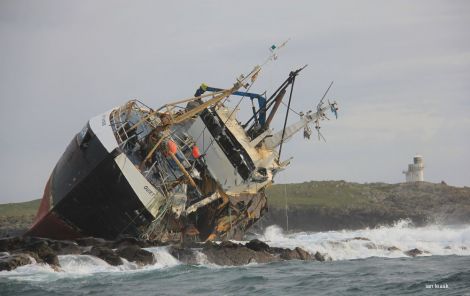News / Concern as Quiet Waters breaks up
CONCERN has been raised that the wreck of the Shetland whitefish trawler Quiet Waters could cause a hazard in the area now that it has started to break up following Thursday’s gale force winds.
The Coastguard, and environmental health officers as well as the aquaculture industry are all keeping a very close eye on the vessel, which lies high and dry on Atla Holm, just outside the village of Hamnavoe, in Burra.
Staff at nearby Scalloway harbour have already been out to collect timber and other debris that might cause a hazard to shipping approaching the port.
Six fishermen were airlifted to safety 12 days ago when the Quiet Waters ran at full speed onto the rocks. Fuel, fishing nets and other potential pollutants were removed after it quickly became clear that the vessel could not be refloated.
Colin Mulvana, a counter pollution and salvage expert with the Maritime and Coastguard Agency (MCA), visited the site on Friday morning to assess the situation.
He said it was up to the secretary of state to decide whether the vessel caused a hazard to shipping or to human health, and that would depend on what the insurance company proposed to do with the vessel.
“The vessel is quite high up. It will depend a lot on the weather as to what they can do and if there is a potential to remove her. We just have to wait and see.
“We will get a report from the insurance company as to what their intentions are, and it would be safe to say that then there would be discussions with the secretary of state’s representative over the fate of the vessel.”
But David Sandison of the local salmon farming trade body Shetland Aquaculture said the situation was “unsatisfactory” as floating debris could pose a threat to salmon cages in the area.
Become a member of Shetland News
“The insurers of the vessel seem not to understand the public liability they may have to think about if a large chunk of debris comes along a salmon cage in the middle of the night and rips the net below the water line. You would lose a cage full of fish.
“I know that this is a disaster scenario and it is not likely to happen, but why let these things just take their own course when you could do something about it. One cage of fish is more worth than that boat,” he said.
Meanwhile, Shetland Islands Council’s environmental health department has been keeping an “interested eye” on developments, but has no powers to intervene unless the hazard was onshore.
Service manager Maggie Dunne said: “We would deal with anything that comes ashore, assessing any hazard and removing anything that may pose a public health hazard.”
Become a member of Shetland News
Shetland News is asking its many readers to consider paying for membership to get additional features and services: -
- Remove non-local ads;
- Bookmark posts to read later;
- Exclusive curated weekly newsletter;
- Hide membership messages;
- Comments open for discussion.
If you appreciate what we do and feel strongly about impartial local journalism, then please become a member of Shetland News by either making a single payment, or setting up a monthly, quarterly or yearly subscription.




























































